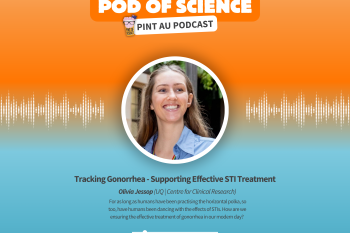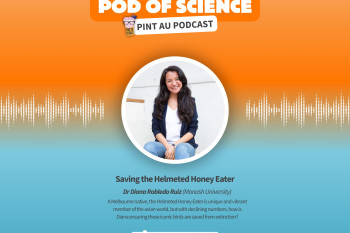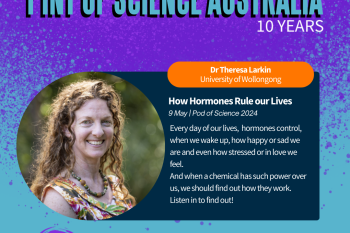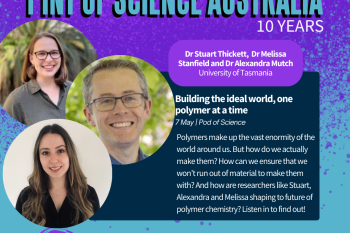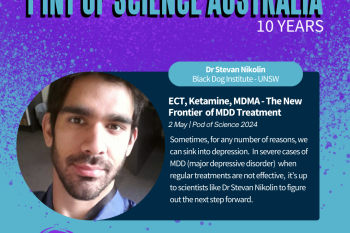© Pint of Science, 2025. All rights reserved.
How does Physics help build a computer? What if that was a computer that is so powerful it doesn't exist yet? Dr Chris Ferrie and his team are using Quantum Physics to help simulate and model Quantum problems leading to Quantum computers. Listen in to see what else he does in his spare time.
~~
Transcript
Camille Thomson: Well here we are for a Pod of Science, part of Pint of Science Australia. We are running an online festival this year, and I am pleased to have Chris Ferrie with me today. How are you Chris?
Chris Ferrie: I'm well, thank you.
Camille: Excellent. Ah, so perhaps Chris you could tell us in a few points a little bit about the work that you do.
Chris: Sure, no problem. Well, I kind of wear two hats. As an Associate Professor I lead a research group that works in the area of Quantum Computing and in the evening I write children's books. So I write about science for children.
Camille: That’s exciting. Definitely the Quantum computing is exciting, but the books for children is definitely up my street. What kind of lead you into this kind of Quantum Computing area? It’s not like someone wakes up and says “I want to be a Quantum Computing person”.
Chris: No, not not at all. Although yeah, hopefully I can induce a few, a few young people to think that way. It was kind of happenstance, really, I think. You know it's hard to imagine a specific sort of point in your life where you know if that didn't happen, you'd be on a completely different track. The University that I went to for my undergraduate degree had lots of quantum physics courses on offer and then the people that were teaching those actually did research in quantum computing. And so you get talking to your professors and they tell you about interesting problems that they're working on. And I had done a few summer projects with them, and I really enjoyed it. And so that's kind of where I continued my higher degree in that area, yeah.
Camille: It’s always the thing, as you say, a multitude of things lead you towards it. So what exactly are you working on at the moment? What’s you big project at the moment?
Chris: Yeah, so it's a it's quite a large research group and so we work on a few different things. There's some overlap, but broadly it's about trying to figure out if someone's in a lab and they isolate some sort of quantum system. Figure out what that description, what that model quantum model should be for that system. And these might be real real physical things like atoms, I trap an atom somewhere in my laboratory. With all sorts of equipment as a very unnatural state for an Atom to be in alone by itself inside of a trap. So coming up with a description of that is difficult. It might be an engineered system like an artificial Atom so we can manufacture with nano technology little circuits that act like atoms and coming up with a description of those is again a difficult task. So our job is to tell the people in the lab what sort of measurements they should do, and then they give back the data to us. And then we come up with algorithms to process that data in optimal ways to produce a description of what's going on in their lab. And then once we have that, then maybe we want to do something with those physical systems we want to build technology out of them. So how do you take the description and then turn that into it doing something useful? So we do, we do both of these things and sometimes we combine these tasks.
Camille: Really out there thinking. So what are some of the obstacles that you guys come across in your field that slow things down or make it difficult to get the answers you need?
Chris: Yeah, so we want to build large scale technology and at the moment that's it's a slow process. So around the turn of the century, we had quantum technology devices that had maybe five or six of these quantum bits. So your phone today has a billion bits. It can store billion bits of information, and that's why it can do all sorts of amazing things. A quantum computer today, maybe in the order of 50 of these quantum bits called qubits. So at 50 today, at the turn of the century, we had five, so the progress is slow. And it's sort of dynamic interplay between people trying to build physical technology in laboratories and the people working on the mathematics and the theories, and we go back and forth, back and forth. And you know, for a while there wasn't a lot of people working on this, and that means there wasn't a lot of interest, and it wasn't a lot of money. Yeah, this is sort of the ultimate driver of science at the end of the day is money and funding. So you kind of work on what you're funded to work on. And now it's fairly good. There's there's quite a bit of funding available globally and in Australia to do this kind of thing, so I think we'll see more rapid progress as time progresses.
Camille: And are you seeing the people come into the field as well as the funding?
Chris: Yeah, so quantum computing is is in the news all the time and you see a lot of students interested in quantum computing. And nowadays yeah, every University or consortium of universities has like a group of students like a sort of interest group, even if they're not enrolled in subjects. They still have groups of students that are interested in it. A lot of people have the feeling that even if I’m not in the field of quantum computing, but I'm in technology, I should at least know what this new up and coming thing is. So it's a challenge to cater to those needs as well. But you also see a lot of people already in, professionals in technology who maybe want to upskill or actually even potentially change fields into quantum computing. Yeah, so it's a really exciting time.
Camille: That’s pretty cool, the changing is a good thing for everybody out there. So Quantum Computing isn’t really something you can physically put your hands on. It’s not a chemical reaction, or a robot that walks out the door, it’s a part of those bits. But what are some of the benefits that society might see from the work that you’ve been doing?
Chris: Yeah, I mean the promise of quantum computing is really sort of a paradigm shift in what we should be capable of doing it the way that I like to think about it. I mean, we don't really know what's going to happen in the future. My favourite quote of all time in like 1949 the Chief Technology Officer of IBM said, “I don't think there will be a market in the world for more than five computers.” And looking around my desk I I see, I see six or seven on my desk. So yeah, making predictions about the future is dangerous, but there's one way that I like to think about it. That's in terms of simulating physics. So when you think about an airplane, nobody is going to fly an airplane, let alone build an airplane, unless it's been simulated. So you imagine like a wind tunnel, and then you put a wing in a wind tunnel. That's a simulation of how the real thing might act once I build it and put it out in the real world. Nowadays, all simulations are done on computers, so you're not going to build a bridge and less you have a simulation. Of how it works and how it's going to be affected by the environment, you're not going to build a building unless it's been simulated and quantum physics is really a crucial area where we can't do simulations. So quantum physics is like the basis of all material science, and so even computers today required knowledge of quantum physics to come up with new materials. Buildings require unnatural materials. Yeah, the other area is medicine, right? So we want to know if we create a molecule, how that will interact with a biological system or another biological molecule and the way we do it today is in some sense simulation, like we simulate it in unfortunate laboratory animals like mice. But that's the only way we can figure out what a potential molecule will do in the presence of other molecules. Imagine if we could simulate that on a computer. That would be revolutionary. So if we know that if we could simulate quantum physics on computers, then you know there's really no end in the imagination of scientists working with these things to what we could do. Like if you could just test, hey, here's a potential medicine, what will that do? And within a few minutes have an answer. And then we wouldn't, we wouldn't take years and years to do the kind of long scale testing that's necessary with the existing ways we create medicines and materials. Yeah so. It's going to be, it's going to be revolutionary if and when we can build a quantum computer and our research team isn't building quantum computers, but we're making small steps along the way to help make this happen.
Camille: That’s what science is all about, everybody doing little bits of the puzzle to work towards a common goal. With that kind of big wide breadth, what something that you would like to see researchers in your field working on? Is it medical stuff? Is it actually building the supercomputer? Is there something you hope future researchers will be working on that they aren’t now?
Chris: I think at the moment one of the one of the main issues is that the way the way most academic research works is you have a lot of small kind of islands. So each research group is its own island, and they’re kind of competing for recognition and space and funding. Although you know we're all friends and we get together at conferences and talk to each other and share our research, really we're in competition. And I think what we haven't come to appreciate is the idea of building a quantum computer is enormous challenge on the scale of like landing humans on the Moon or Mars. We need a huge collaborative effort and I'd like to see that in our field rather than a research group at this University and this University. And you know, occasionally they meet at conferences to tell each other what they've done in the past year. A more collaborative, and coordinated effort under the, you know, under the realization that this is an enormous, you know, one of the probably the most enormous technological challenge that humans have come up against.
Camille: Yeah I’ve seen that coming out of a lot of areas like big data and others relying on needing this capacity in the future for computing of everything. So we’ve got to get behind it. This may already partly answer my next question, which is… Outside of your field, and looking at science as a whole, what do you think are some of the biggest challenges facing science right now?
Chris: I think science. Yeah, science has a I think a problem with image in many many parts of the world. So there's really just a misunderstanding, I think, both in just the public's general perception and certainly within, like Hollywood, what science is and what scientists do. We see with the COVID-19 pandemic that can be really dangerous when people don't understand just basic things in science that most of the time scientists are wrong, but they're wrong in useful ways that make progress. And scientists understand that at any point in time a scientist knows that they're currently wrong and they're trying to be more right. And at no point does a scientist say I have all the knowledge and I'm currently in possession of the truth. You know, we never have that. We're always working towards it, and so we make our best guesses along the way. But we're not shooting in the dark, you know we, our guesses are usually pretty good. And the other thing that they always come with is is hedged bets. You know we say. We don't say that the temperature of the Earth is going to warm by exactly 2 degrees in the next two years. You know, we say maybe it won't warm at all, and maybe it will warm by 5, right? That's our best guess, right? And what people expect is definitive answers. And that's you know that's not something anyone, science or otherwise can provide. But science can provide the best answer. And that comes with, you know there are errors and we understand those and are prepared to to deal with them.
Camille: Yeah and I think scientists are becoming more comfortable with saying “this is our best guess and the information is new and now we’re changing it because of that new information”. And people are starting to as you say understand that concept. I’m going to help you switch hats for a little bit and ask you a quick question of what kind of topics do you cover in your children’s science books?
Chris: Oh well. We cover everything. So the very first book was quantum physics for babies. There's a board book. Like most board books, short short sentences, short number of pages, very visual. And yeah, it's about quantum physics. You can read to your baby. And since that book we've covered lots of topics and for topics that are outside my area of expertise, I enlist experts, Co-authors who help me craft the story. So we've gone from quantum physics for babies all the way to climate change for babies. Yeah.
Camille: Wow. It’s all things that are going to affect them in their lifetime isn’t it? So better to start them early.
Chris: Well, yeah, I always like to think of it as books for parents. Yeah, children don't know that being read quantum physics is strange. It's parents that think that. So a child, people are surprised if a child goes to the bookshelf and takes out the quantum physics book. But from their perspective it's just a book and that book people around me are excited about and they think it's fun to read. So that's the one I'm going to choose. So if you, no matter what you read, if you read it with enthusiasm, the children will like it. So really you know it's for the parents and one of the things that you know breaks my cold academic heart is when I speak to other parents and I tell them what I do and they say oh, you know I kind of hated science or I hated physics in school or math was my worst subject. And that attitude I think really rubs off on children. And I have seen it happen where you know a child brings home a bad test or you know their teacher says they’re not doing so well in this area of mathematics and the parent will say, well, you know I was never good at math, so and look at me I'm fine. So maybe you don't maybe just not a math person like me and you don't need to worry about it. But yeah, that's that's a terrible attitude to have and I'm hoping that this can help people feel a little bit more comfortable in thinking that these topics are for everyone and it just you know, just takes time and practice and enthusiasm and and everyone can appreciate it.
Camille: Yeah, it’s science by osmosis. I do like that. So my final question is why did you choose to be part of the Pint of Science festival?
Chris: I've attended the Pint of Science back when we used to get together and yeah, social distancing was was a little bit had shorter, lower bound upper bounds on it. And it was it was always great fun. And yeah, I wanted to support it and support science and make sure that people are always interested and the people that already are interested that crave to hear about what scientists are up to. I just wanted to support that.
Camille: It’s brilliant and we’re really keen and looking forward to being back live and non socially distanced in pubs and cafes soon. But it’s been a real pleasure to have you here on a Pod of Science today and we look forward to hearing about your work in leaps and bounds. And to seeing more people reading to their kids about your work. Thank you so much Chris.
Chris: Thank you.
Camille: You can catch up on all our previous episodes on Soundcloud and Spotify. Don’t forget you can support your Pint of Science festival by jumping on our website. We’ll see you next time on a Pod of Science.
